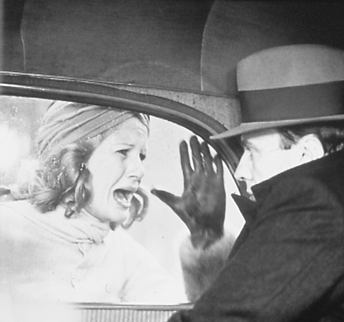Secretive gay sex, murder and treachery in Bertolucci classic
If ever anyone relished the pivotal truth that dreams are movies, movies are dreams, it is Bernardo Bertolucci in 1970. A prize-winning poet not yet 30 years old, Bertolucci wrote and directed the movie “Il Conformista” (from the Alberto Moravia novel) that is in itself one great compulsive, overpowering dream, recalled almost entirely in flashback by the buttoned-up, starch-faced Marcello Clerici – the extraordinary Jean-Louis Trintignant – in the back seat of a car that is being driven through the night to where he has been assigned to murder the anti-Fascist professor who was a hero of this aspiring Mussolini-era apparatchik’s university days.
Clerici’s very soul is buttoned up. “I’ve committed all the sins, even the worst one, when I was 13,” he stonily admits, or brags, in the confessional booth. We see the scene reenacted: a misfit 13-year-old flirt shooting the chauffeur who has just had carnal knowledge of him.
“It’s almost as if you consider sodomy a worse sin than murder,” snaps the priest in dismissal. But for Clerici in his perpetual, stiff, high-collar, necktie, hat, gloves, overcoat, there is no choice of sins. There is only sex, Fascism, and death. Not his death. That of others.
“The Conformist,” which on July 29 opens a two-week run at the Film Forum on Houston Street — in a new 35mm print of the original European version — is a movie for grownups. It is as inevitable as the Iron Maiden — that medieval torture coffin lined with spikes — but here there are also two other iron maidens, Clerici’s silly, ditsy, petit-bourgeois wife, Giulia (Stefania Sandrelli), hot and cold all in one kewpie-doll package, and the professor’s icy, stunning, bisexually seething wife, Anna (Dominique Sanda, real-life later mistress of Francois Mitterand), who is attracted to, yet despises, Giulia’s husband — and Giulia as well — all in one frigid gulp.
The double-seduction tango between the two ladies is not soon to be forgotten, nor is the wild mass of humanity — the farandole — that encircles and engulfs terrified Clerici like nothing so much as the fearsome whirlpool in Michael Powell’s “I Know Where I’m Going.”
Humanity again puts in its claim when, in a passing moment on the street, a beautiful young woman selling violets (none other than Sanda herself, if I’m not mistaken) suddenly breaks into “Arise, ye prisoners of starvation!” — the Communist “Internationale” — and with two little kids singing away, pursues Clerici down the sidewalk.
There are riches without end in this motion picture, every telling fragment of the dream, or half-dream/half-harsh reality, weaving in and out of time sequence, but always dream-logically decipherable.
And dream rhythm. His Fascist overseers have seen to it that a hulking, cigar-chewing enforcer (Gaston Moschin) goes everywhere that Clerici goes, holding him, so to speak, to the grindstone. This thug’s unexpected, shocking forehand/backhand rat-a-tat disposal of Clerici’s mama’s inamorata (and drug supplier) is not long later echoed by Clerici’s obedient, dog-like rat-a-tat of scurrying footsteps as he follows a bullying Fascist superior through a door.
Speaking of dogs, they appear in various sizes, breeds, ownership, menace or mildness, throughout the film. I pray you, sir, whose dog are you?
Dogs and spaces. Over and over again we are thrown into the vast, white marble emptiness and grandiosity of Mussolini architecture, once even at a vast, unroofed stone-seated stadium that also serves as the insane asylum where Clerici’s father, waving the arms of his wrap-around straitjacket like vulture wings, lives out his equally empty days and years.
I have not talked of the double murder that is the climax of this dream, or nightmare. A man — the professor (Enzo Tarascio) — beaten and stabbed to death by three or four faceless assassins in overcoats in a snow-carpeted pine forest, to the sound of gasps and grunts. A woman, the professor’s wife, beating for refuge with her two fists against the sealed window of the car within which sits her sexual mismatchmate, buttoned up as always. Impervious, unmoving.
And then her screaming, bloody flight, across the snow, through the trees. Another Anna — Magnani — was there once, but that was in another place, a place called Rome, and another movie, on a street without trees.
On the way out of a preview last week at Film Forum. Somebody said: “As great as when I saw it first, 35 years ago.” Somebody else said: “Greater.”
gaycitynews.com


































